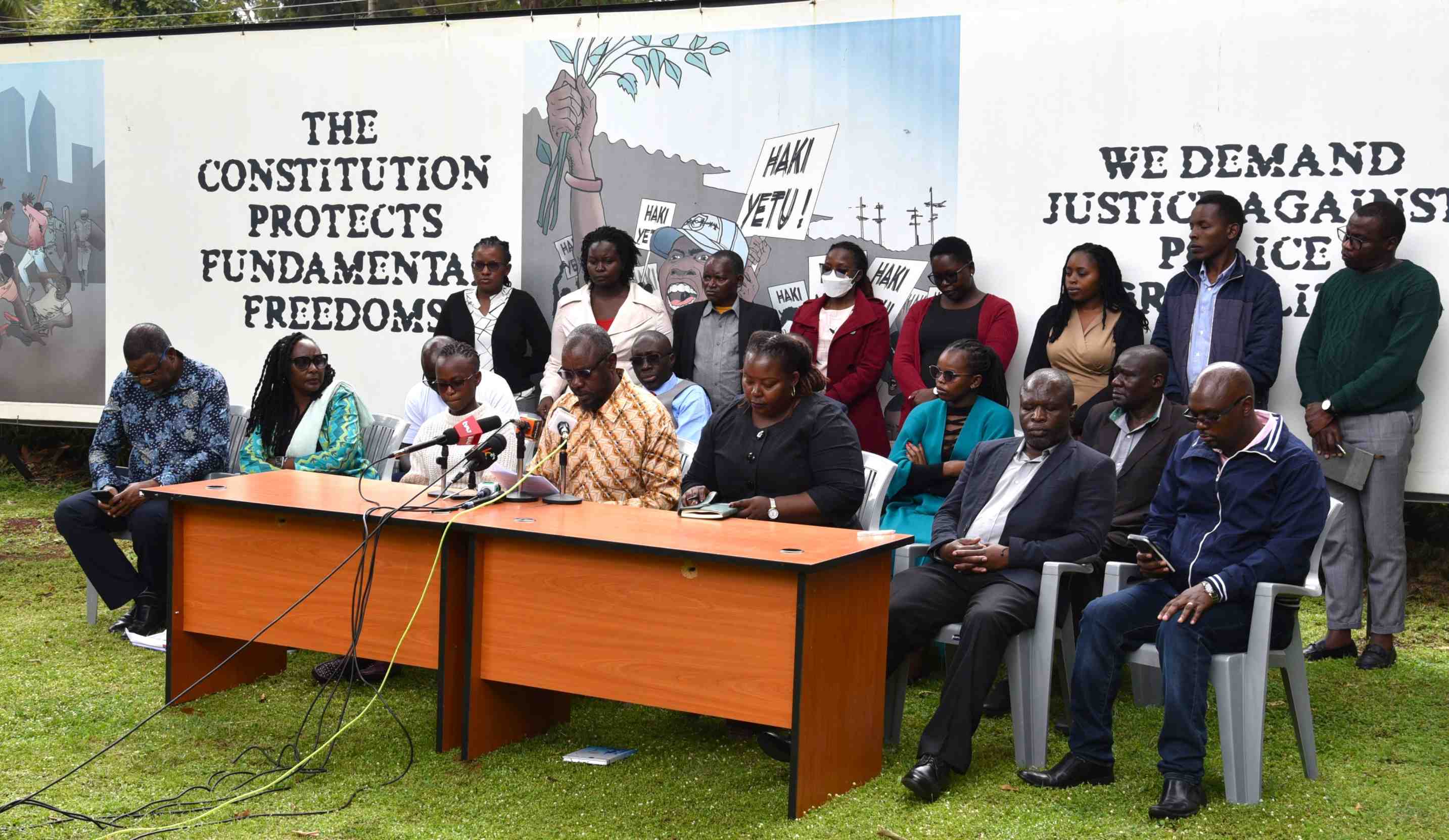Human Rights groups accuse State of repression and failed governance

A recent government report showed that 129 women were murdered in the first three months of 2025 alone. KHRC wants femicide to be recognized as a separate criminal offence under the Penal Code.
A group of civil society organizations has delivered a harsh evaluation of President William Ruto’s government at its mid-term point, accusing it of weakening democracy, undermining basic freedoms, and presiding over growing social and economic distress.
The organisations, drawn from human rights, legal, and policy advocacy circles, gathered in Nairobi to present their concerns, citing a wide range of problems from extrajudicial killings and enforced disappearances to a crumbling health system and rising political violence.
"This is a state of national despair. We are witnessing a regime that is systematically dismantling democratic governance and civic freedoms," said Davis Malombe of the Kenya Human Rights Commission (KHRC) during the press briefing.
The coalition expressed concern over the state of civil liberties in Kenya, pointing to a global civil society watchdog, CIVICUS, which downgraded Kenya’s status from "obstructed" to "repressed" in 2024.
Malombe said the government’s failure to deliver on essential services was having devastating consequences.
"Citizens are dying in hospitals, students are stranded in universities, and the youth face police crackdowns for merely expressing dissent," he said.
According to the Independent Medico-Legal Unit, 228 incidents of police torture and 67 extrajudicial killings were recorded between January and September 2023.
The Kenya National Commission on Human Rights also documented 63 deaths and over 600 injuries from last year’s Gen Z protests.
"The State has abandoned the rule of law. Disappearances, abductions, and violent arrests have become normalised," Malombe added.
He said at least 26 people are still missing, allegedly taken by elite security units such as the Anti-Terror Police Unit, National Intelligence Service, and the DCI.
The organisations called for impartial investigations into the abductions, killings, and police violence, demanding prosecution of both perpetrators and senior officers involved.
"Those found culpable, including high-level command, must be held accountable for their crimes. This regime must immediately cease the politicisation of security agencies and disband elite police units involved in unlawful operations," he said.
Political tensions and violence were also highlighted as major threats to peace and democracy.
Nerima Wako of Siasa Place said that political intolerance, criminal gangs, and gender-based violence are on the rise.
"In 2024 alone, 570 femicide cases were recorded. This means that more than 30 women are killed every month. This is a direct consequence of state failure to protect women," said Wako.
She linked the violence to state inaction and impunity, citing recent attacks on public gatherings and protests that turned violent in Nairobi and Limuru during President Ruto’s tour.
A recent government report showed that 129 women were murdered in the first three months of 2025 alone. KHRC wants femicide to be recognized as a separate criminal offence under the Penal Code.
The education and health sectors were also said to be facing a crisis. Cornelius Oduor from KHRC accused the government of ignoring the needs of learners and patients.
"Universities are collapsing, funding is chaotic, and the new university model has been declared unconstitutional, yet the government insists on implementing it," he said.
He added that the shift from NHIF to the Social Health Authority has caused disruptions in the delivery of healthcare, leaving providers unpaid and patients stranded.
The activists are also raising the alarm over housing demolitions and forced evictions carried out under the affordable housing programme. Many families, they said, have been left homeless without proper compensation.
On economic issues, Sheila Masinde of Transparency International-Kenya described Kenya’s current state as a case of elite control of public finances.
"The presidency and Treasury have been turned into instruments of elite plunder. Public debt continues to balloon with little to show for it. Corruption is choking the nation," she said.
Masinde warned that the country faces a bleak economic future unless there is a strong and transparent crackdown on graft.
The coalition accused the government of targeting civil society and media, citing the deregistration of more than 2,800 public benefit organisations last year.
Catherine Mbui of Article 19 Eastern Africa said, "There have been physical attacks on journalists, cancellation of government advertising to independent media houses, and new lows that extend digital surveillance. This is a systematic erosion of free expression."
The group is calling for a complete shift in governance, demanding the state take responsibility for human rights abuses, economic mismanagement, and weakening of institutions.
